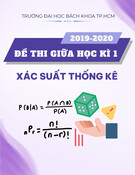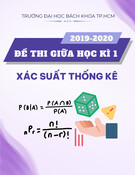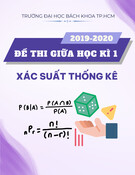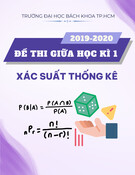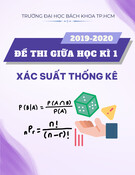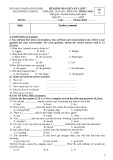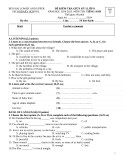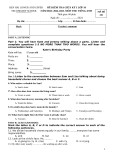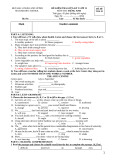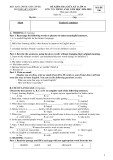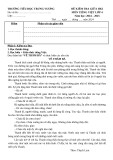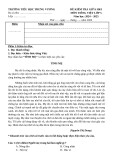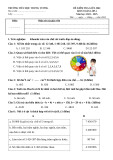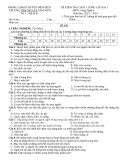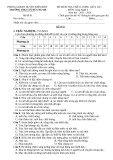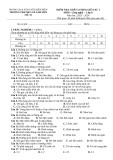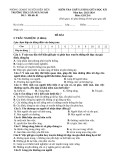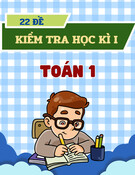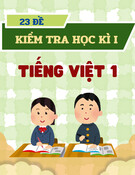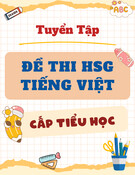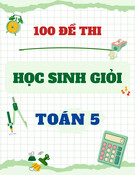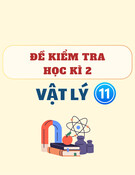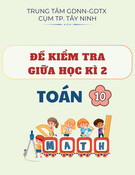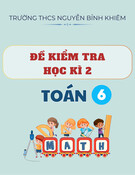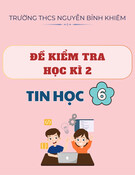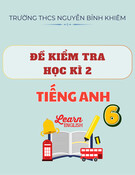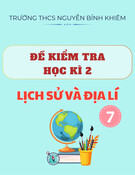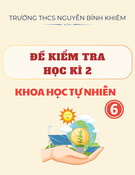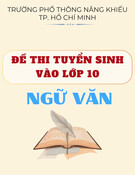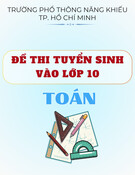Ể
Ề
Ỳ
Ỳ
Ệ
ƯỜ
Ị Ọ
Ả Ở S GD&ĐT QU NG NAM Ọ Ỳ NG THPT HU NH NG C HU
TR
Ế
Ệ
ờ
ề (Đ thi có 4 trang)
ể ờ
Ọ Đ KI M TRA Đ NH K H C K I NĂM H C 2022 2023 MÔN: TI NG ANH 12 H 7 NĂM Th i gian làm bài: 45 phút ề (không k th i gian phát đ )
Mã đ 101ề
Mark the letter A, B, C or D on your answer sheet to indicate the correct answer to each of the following questions. Question 1: He has worked as an engineer ______________from university .
A. while he was graduating C. since he graduated B. After he had graduated D. before he had graduated
Question 2: John ____________ a book when I saw him.
A. read B. was reading C. is reading D. reading
Question 3: I asked him whose car ___________the previous day.
A. he had borrowed D. he would borrow
C. had he borrowed B. did he borrow Question 4: In many cultures, people signify their agreement by ___ their head.
A. turning B. raising C. pointing D. nodding
Question 5: Students are_________ less pressure as a result of changes in testing procedures.
A. out of B. above C. upon D. under
Question 6: They agree that a wife should maintain her ___________ and appearance after marriage.
Mã đ 101ề Page 1/5
A. beautiful B. beautify C. beautifully D. beauty
Question 7: He said that he _______________________ his bike the night before.
C. had lost D. has lost A. was lost B. lost
Question 8: The boy waved his hands to his mother, who was standing at the school gate, to _________ her attention.
A. attract B. pay C. pull D. follow
Question 9: Some of my students are quite _______ and enjoy playing tricks on their friends.
A. obedient B. mischievous C. supportive D. passive
Question 10: We are a very _____________family. All of us have very close relationship with one another.
A. friendly B. closeknit C. strange D. typical
Question 11: They ____________ him for weeks.
A. do not see B. have not seen C. did not see D. had not seen
Question 12: The state school system _______________for by the state. B. will pay A. is paid C. pay D. paid
Question 13: We _____________________ our old teacher at the conference two days ago.
A. met B. meet C. had met D. has met
Mark the letter A, B, C, or D on your answer sheet to indicate the most suitable response to complete each of the following questions. Question 14: Mary is talking to Susan about her new Tshirt. Mary: “What a beautiful Tshirt!” Susan: “__________”
A. You're welcome C. Thanks. I’m glad you like it. B. What a pity! D. I don’t think so
Question 15: Lan and Nam are talking about home life. Lan: In my opinion, in Vietnam, three or even four generations may live in a home. Nam: ________________. They can help each other a lot.
A. I quite agree with you C. I don’t think so B. Not mention it. D. That’s not true
Mark the letter A, B, C or D on your answer sheet to indicate the word that differs from the other three in the position of primary stress in each of the following questions. Question 16: A. family Question 17: A. happy B. different B. maintain D. tradition D. discuss C. hospital C. believe
Mark the letter A, B, C, or D to indicate the underlined part that needs correction in each of the following questions. Question 18: Whistling or clapping hands to get a person’s attention is impolitely.
A. attention B. impolitely C. Whistling D. get
Question 19: My mother always get up early to prepare breakfast for everyone in the family.
A. family B. for C. get up D. to prepare
Mark the letter A, B, C, or D on your answer sheet to indicate the sentence that best combines each pair of sentences in the following questions. Question 20: She typed all the reports. Then she sent it to the director. A. After she had typed all the reports , she sent it to the director. B. She typed all the reports after sending it to the director. C. She sent all the reports to the directors and then typed them.
2
D. She typed all the reports when she sent it to the director.
Question 21: John returned home. At that moment, we were having dinner.
A. John returned home when we stopped having dinner. B. When we started having dinner, John returned home C. As soon as we were having dinner, John returned home D. John returned home while we were having dinner.
Mark the letter A, B, C, or D on your answer sheet to indicate the word whose underlined part differs from the other three in pronunciation in each of the following questions. Question 22: A. clears Question 23: A. smiled D. talks D. studied B. brings B. wanted C. trains C. agreed
D. suggestion B. attention A. belief
Question 25: All students are revising carefully, for the final test is approaching soon.
Mark the letter A, B, C or D on your answer sheet to indicate the word(s) CLOSEST in meaning to the underlined word(s) in the following questions. Question 24: Teachers can't give students any assistance in exams. C. help C. reaching fast D. coming near A. getting near B. going fast
Mark the letter A, B, C, or D on your answer sheet to indicate the sentence that is closest in meaning to each of the following questions. Question 26: They believe that the thieves got in through the kitchen window.
A. They believe the thieves got in through the kitchen window. B. They believe the thieves have got in through the kitchen window. C. The thieves are believed to have got in through the kitchen window. D. The thieves are believed to get in through the kitchen window. Question 27: “I’ll help you repair this washing machine, Jenny”, he said.
A. He admitted helping Jenny repair that washing machine. B. He refused to help Jenny repair that washing machine. C. He promised to help Jenny repair that washing machine. D. He denied helping Jenny repair that washing machine.
Question 28: “What did you do last weekend, Tim?” Alice asked.
A. Alice asked Tim what did he do last weekend. B. Alice asked Tim what he had done the previous weekend. C. Alice asked Tim what had he done the previous weekend. D. Alice asked Tim what he had done last weekend.
Read the following passage and mark the letter A, B, C, or D on your answer sheet to indicate the correct word or phrase that best fits each of the numbered blanks from 29 to 33.
Parents often have dreams for their children’s future. They hope their children will have a better life than they had. They dream that their children will do things that they couldn’t do. Parents (29)________ come to the U. S from foreign countries hope their children will have better (30)_________ here. They think their children will have more career choices and more successful lives. Parents make (31) __________ sacrifices so that their children will have more (32) ________ . They think their children will remain close to them because of this. Some children understand and appreciate these sacrifices and remain close to their parents. (33)___________, other children feel ashamed that their parents are so different from other Americans. B. who Question 29: A. which B. education Question 30: A. educated C. whom C. educational D. when D. educate
Mã đ 101ề Page 1/5
Question 31: A. little Question 32: A. abilities Question 33: A. However B. much B. opportunities B. So C. each C. responsibilities C. Therefore D. many D. possibilities D. Despite
Read the following passage and mark the letter A, B, C, or D on your answer sheet to indicate the correct answer to each of the questions from 34 to 38.
Marriage nowadays is a choice people make on their own, but this has not always been the case in society. Thousands of years ago, the average lifespan was shorter than it is today. A man usually lived until he was about 40 years old, while women died even sooner because of childbirth. There were many wars and illnesses, and people had to protect themselves by having more children while they were still young. The parents lived through their children.
Marriage was not so much a romantic love story but a business transaction, or deal. Most marriages were arranged between parents while their children were still very young. It was the custom that the fathers made the decision on whom their children were going to marry. The mothers had little say in it since they rarely made any decisions outside the household. The fathers would meet to arrange the wedding date and the money given for the bride on her wedding date. The more money and land a girl had, the more chances she had to marry well. Therefore, it was important that her father choose the bridegroom very well. Usually, it was someone who came from a good family or who was rich too. It was very unlikely that people married outside their social class. A few welloff and rich merchants got to marry poorer noble women and became King’s business advisors. In a way, poor peasants had an easier choice as it was less important whom they married.
The practice of arranged marriage is still common in some countries in the Middle East, such as India or Pakistan. Here, social classes are still strongly divided and very wellkept. Often, however, arranged marriages are a sign that people do not want to let go of the past, which gives them comfort and security in an ever changing world. Question 34: What does the passage mainly discuss?
A. Marriage practices in modern society. B. The practice of arranged marriage. C. Marriage as a business transaction today. D. Mothers' roles in their children's marriage.
Question 35: The word "it" in paragraph 1 refers to ___________________.
A. a choice C. marriage B. the average lifespan D. society
Question 36: According to paragraph 1, women died even sooner than men because of _____________.
A. wars D. childbirth . C. marriage B. illnesses Question 37: According to paragraph 2, richer girls were more likely to
A. become noble women C. marry peasants B. succeed in business D. marry well . Question 38: The author mentions all of the following in the passage EXCEPT __________.
A. Men made almost all decisions inside the family B. Marriage used to be a deal between two families C. The wedding date was decided by the fathers D. People tended to marry outside their social class
Mark the letter A, B, C or D on your answer sheet to indicate the word(s) OPPOSITE in meaning to the underlined word(s) in each of the following questions. Question 39: In most countries, compulsory military service does not apply to women.
B. beneficial C. required D. optional A. special
Question 40: It would be helpful if you were to precede the report with an introduction.
B. suppose C. follow D. come before A. believe
4
THE END
Mã đ 101ề Page 1/5

